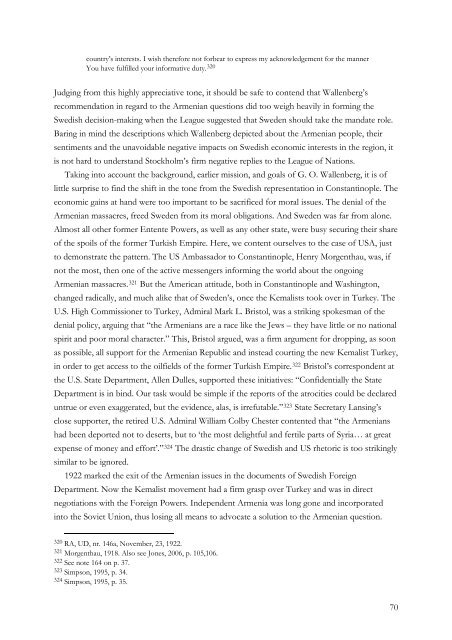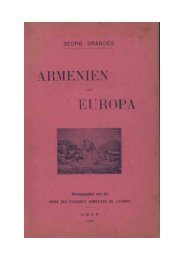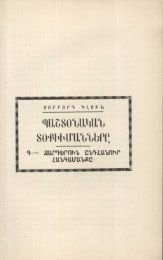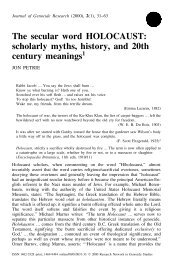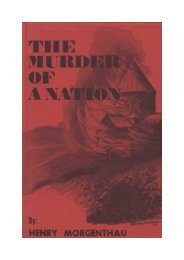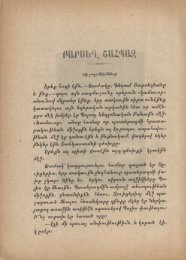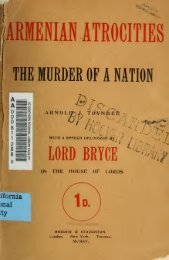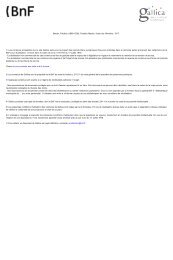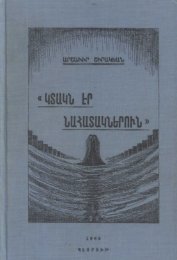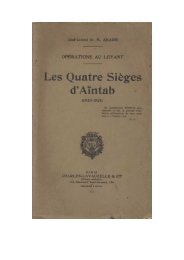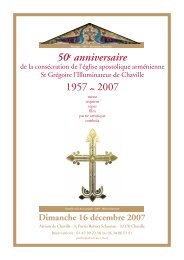country’s interests. I wish therefore not forbear to express my acknowledgement for the mannerYou have fulfilled your informative duty. 320Judging fr<strong>om</strong> this highly appreciative tone, it should be safe to contend that Wallenberg’srec<strong>om</strong>mendation in regard to the Armenian questions did too weigh heavily in for<strong>min</strong>g theSwedish decision-making when the League suggested that Sweden should take the mandate role.Baring in <strong>min</strong>d the descriptions which Wallenberg depicted about the Armenian people, theirsentiments and the unavoidable negative impacts on Swedish econ<strong>om</strong>ic interests in the region, itis not hard to understand Stockholm’s firm negative replies to the League of Nations.Taking into account the background, earlier mission, and goals of G. O. Wallenberg, it is oflittle surprise to find the shift in the tone fr<strong>om</strong> the Swedish representation in Constantinople. Theecon<strong>om</strong>ic gains at hand were too important to be sacrificed for moral issues. The denial of theArmenian massacres, freed Sweden fr<strong>om</strong> its moral obligations. And Sweden was far fr<strong>om</strong> alone.Almost all other former Entente Powers, as well as any other state, were busy securing their shareof the spoils of the former Turkish Empire. Here, we content ourselves to the case of USA, justto demonstrate the pattern. The US Ambassador to Constantinople, Henry Morgenthau, was, ifnot the most, then one of the active messengers infor<strong>min</strong>g the world about the ongoingArmenian massacres. 321 But the American attitude, both in Constantinople and Washington,changed radically, and much alike that of Sweden’s, once the Kemalists took over in Turkey. TheU.S. High C<strong>om</strong>missioner to Turkey, Admiral Mark L. Bristol, was a striking spokesman of thedenial policy, arguing that “the Armenians are a race like the Jews – they have little or no nationalspirit and poor moral character.” This, Bristol argued, was a firm argument for dropping, as soonas possible, all support for the Armenian Republic and instead courting the new Kemalist Turkey,in order to get access to the oilfields of the former Turkish Empire. 322 Bristol’s correspondent atthe U.S. State Department, Allen Dulles, supported these initiatives: “Confidentially the StateDepartment is in bind. Our task would be simple if the reports of the atrocities could be declareduntrue or even exaggerated, but the evidence, alas, is irrefutable.” 323 State Secretary Lansing’sclose supporter, the retired U.S. Admiral William Colby Chester contented that “the Armenianshad been deported not to deserts, but to ‘the most delightful and fertile parts of Syria… at greatexpense of money and effort’.” 324 The drastic change of Swedish and US rhetoric is too strikinglysimilar to be ignored.1922 marked the exit of the Armenian issues in the documents of Swedish ForeignDepartment. Now the Kemalist movement had a firm grasp over Turkey and was in directnegotiations with the Foreign Powers. Independent Armenia was long gone and incorporatedinto the Soviet Union, thus losing all means to advocate a solution to the Armenian question.320 RA, UD, nr. 146a, November, 23, 1922.321 Morgenthau, 1918. Also see Jones, 2006, p. 105,106.322 See note 164 on p. 37.323 Simpson, 1995, p. 34.324 Simpson, 1995, p. 35.70
The sooner calls referring to the Armenian question could be forgotten, the better it would be forthe ongoing talks with new-born Turkey. The Lausanne Treaty, signed on July 24, 1923 put anofficial end to the Armenian question. At least for the time being.3 ConclusionTaking the data at hand into consideration, two essential facts crystallize: a) the reality of theArmenian massacres and their genocidal aim; b) Sweden behaved as any other bystander insimilar events, and it certainly did behave like a small state, maintaining strict neutrality andfollowing the general flow.It is safe to assert that the Swedish Government had a clear view of what transpired inTurkish Armenia during the Great War. Even if one would disregard the information presentedby the missionaries and the press, the Swedish Government, especially through its Embassy inConstantinople, but also through its Military Attaché in Turkey, was well informed about theongoing annihilation. In his dispatches to Stockholm, Ambassador Anckarsvärd stressed the factthat what took place in Turkish Armenia was neither an act of mutual killings nor measures takenagainst Armenian insurrection, but a well-planned systematic annihilation of the Armenian nation,initiated and implemented by the Turkish Government. This view was verified additionally by theinformation and testimonies published by the Swedish, as well as Danish, Norwegian, German,and American missionaries and relief workers who had returned h<strong>om</strong>e during the last years of thewar. The description and analysis in the investigated sources do speak of a genocide c<strong>om</strong>mittedin Turkish Armenia during the First World War. Yet, the Swedish Government, as well as theSwedish Church, did nothing, neither directly nor indirectly, to stop the massacres, nor did theymake any efforts to protest against the Turkish actions. The reports also indicate that the TurkishGovernment relied on this very fact and anticipated a silent and indifferent world for achievingits goal. Once the protests would c<strong>om</strong>e it would already be late. In any case there would be noArmenia. The study also indicates that, as the Armenian issue entered into the political arena, anincreasing amount of witness accounts and missionary reports started to be published andcontinued even when the politicians abandoned the issue.The bystander role is well-displayed by the Swedish silence during the massacres. Despite theirobvious and reliable knowledge neither the Swedish Government nor the Church issued as muchas a protest or called for an international reaction. There were s<strong>om</strong>e initiatives for urging theSwedish Government to protest against the massacres. A limited number of politicians, such asHjalmar Branting, Carl Lindhagen and influential public figures such as Anna Lindhagen andMarika Stjernstedt did appeal to the Swedish public trying to influence the Swedish decisionmaking,but in vain. It seems that only the missionaries can be “acquitted” fr<strong>om</strong> being bystanders.Where and when possible they did everything in their power to give shelter to the victims,actively worked for providing assistance and food for the deportees, saving as many as possible71
- Page 3 and 4:
1 Introduction.....................
- Page 5 and 6:
War, rather confirm the version of
- Page 7 and 8:
1.2 Previous ResearchWhen discussin
- Page 9 and 10:
Military Attaché and the missionar
- Page 11 and 12:
situation: “It is a crime when Te
- Page 13 and 14:
in the following investigation, whi
- Page 15 and 16:
killed. The slaughterer slaughtered
- Page 17 and 18:
interests. Despite his famous “14
- Page 19 and 20: morality, balance of power, or the
- Page 21 and 22: 4. International organisations (e.g
- Page 23 and 24: warring parties. 104 This observati
- Page 25 and 26: Concerning the protocols of the Swe
- Page 27 and 28: present in Turkey. These documents
- Page 29 and 30: He also mentions meeting an Armenia
- Page 31 and 32: the annihilation. General von Losso
- Page 33 and 34: 1.5 BackgroundIn order to understan
- Page 35 and 36: 1914, when two inspector-generals f
- Page 37 and 38: to Islam or were sold as slaves to
- Page 39 and 40: 2 Empirical AnalysisThe empirical r
- Page 41 and 42: It does not seem to be the Turkish
- Page 43 and 44: The Turks claim that, at the Russia
- Page 45 and 46: The Armenian population has equippe
- Page 47 and 48: 1917 was the revival year for the A
- Page 49 and 50: Even if the communication between t
- Page 51 and 52: implemented against the Armenian na
- Page 53 and 54: Anckarsvärd continued claiming tha
- Page 55 and 56: Germany is blamed for its accessory
- Page 57 and 58: Here Wirsén took the liberty to co
- Page 59 and 60: On February 19, news of new Armenia
- Page 61 and 62: estricted to the fields of intrigue
- Page 63 and 64: generous offer of President Wilson
- Page 65 and 66: Lange gave a detailed description o
- Page 67 and 68: skin was totally scorched. Another
- Page 69: which her recurrently emphasised th
- Page 73 and 74: Despite these facts, Armenia was th
- Page 75 and 76: Svenska Riksarkivet [Swedish Nation
- Page 77 and 78: Bakhtiari, Kalla det vad fan du vil
- Page 79 and 80: Chan, Steve and Drury, Cooper A., S
- Page 81 and 82: Moranian, Suzanne Elizabeth, Bearin


